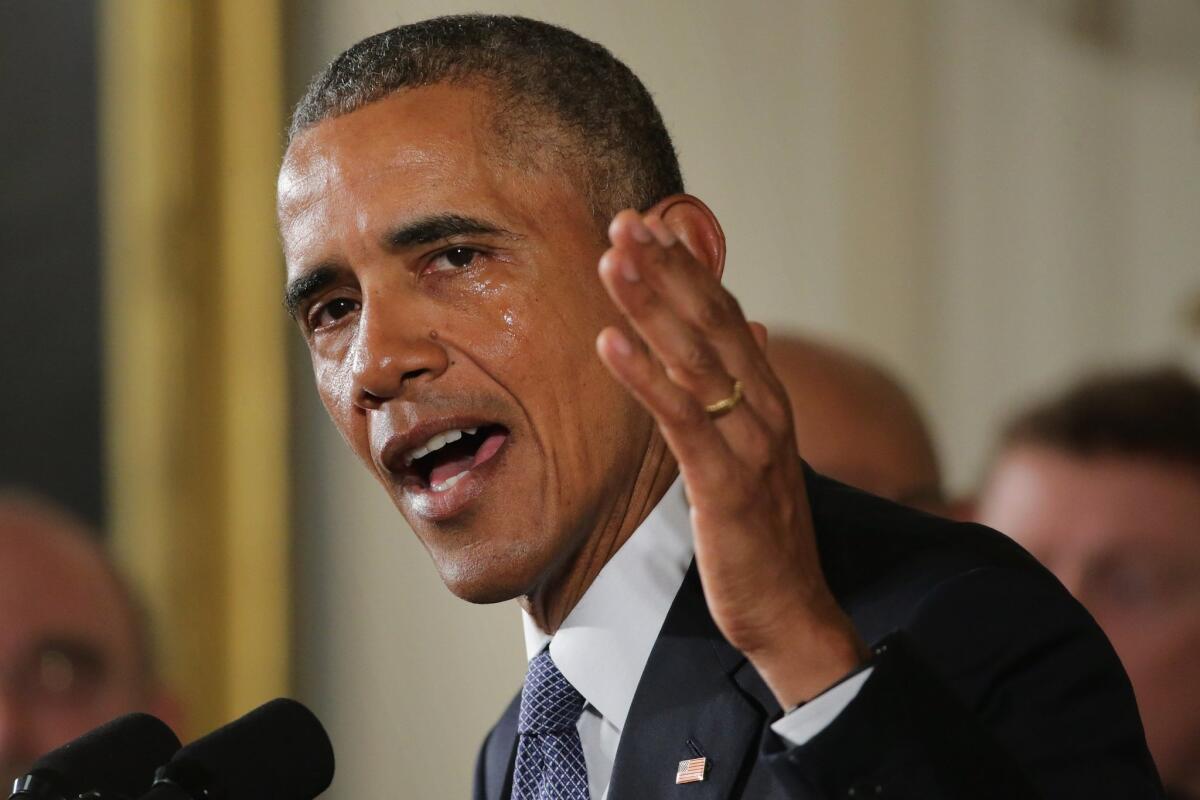An emotional Obama outlines his plan to fight gun violence

A tearful President Obama talks about the victims of the 2012 Sandy Hook Elementary School shooting and about his efforts to increase federal gun control.
Reporting from Washington — President Obama joked, preached and wept in the East Room of the White House on Tuesday, outlining how he will use his authority to fight gun violence but revealing along the way that an appeal to the heart may be the most powerful tool he can muster.
With tears wetting his face at one point, Obama mourned the deaths of innocents and preached the right of children to attend school without fear of a mass shooting, and he voiced anger about the country’s epidemic of gun violence and his well-funded opposition.
“Yes, the gun lobby is loud and it is organized in defense of making it effortless for guns to be available for anybody, any time,” he said. “Well, you know what, the rest of us, we all have to be just as passionate. We have to be just as organized in defense of our kids.”
By choosing an emotional speech over a more sober argument designed to persuade lawmakers, Obama underscored that in effect he was giving up on Congress to act on the issue, even though his own ability to act is limited.
Even after months of study, Obama’s actions on guns amount to a few relatively minor steps on a policy matter that has long been a personal priority.
Under his plan — not an executive order but rather “guidance” for agencies — law enforcement officials will warn private gun sellers that they may be vulnerable to prosecution if they don’t register with the government and conduct background checks on gun buyers.
The Justice Department will also launch an intensive education campaign to push more private sellers to become licensed, while hiring investigators to complete faster and more thorough background checks, which will draw on an expanded database of mental health records.
The changes stop well short of Obama’s far-reaching goals of universal background checks or closing the so-called gun-show loophole, which lets hobbyists and collectors get around the licensing system.
In the past, Obama has made more sweeping use of executive power, as in 2012 when he ordered his administration to defer deportation for young immigrants brought to the U.S. as children. With his powers on immigration policy less clearly defined by law, Obama’s lawyers found a great deal more running room to act when Congress would not.

But even when he does act unilaterally, Obama faces risks. His broad plan in 2014 to temporarily shield millions of people from deportation is held up in a lawsuit. And the Republicans vying to succeed him have all vowed to roll back various programs he’s implemented.
Still, he’s long felt he had to act to curb gun violence.
After the mass shooting at a community college in Roseburg, Ore., in October, he directed staffers to scour existing gun laws for steps he could legally take to strengthen them, apparently concluding that he would get nowhere with a Republican-led Congress. Obama had pushed hard for new legislation on universal background checks after the 2012 schoolhouse massacre in Newtown, Conn., but the proposal ultimately failed on Capitol Hill.
Following Obama’s instruction this time that the actions should withstand court challenge, lawyers found little wiggle room.
As Obama himself noted, Congress has repeatedly defeated efforts to pass meaningful gun control, instead making it more difficult for public health experts to study gun violence and installing roadblocks to data collection for researchers.
“Even after San Bernardino, they’ve refused to make it harder for terror suspects who can’t get on a plane to buy semiautomatic weapons,” he said.
“That’s not right. That can’t be right.”
If any outside event influenced the White House’s decision to act, even if only in a narrow capacity, it was the decision by congressional Republicans to reject proposals that would have barred people on the no-fly list from buying guns, one aide said. It made clear to Obama advisors that lawmakers would not move to reduce gun violence and that the president’s response would be the only one for a while.
Though the steps Obama took were relatively modest, Republicans were nonetheless furious, labeling them a dangerous overreach by the executive and a violation of the constitutional separation of powers.
“His words and actions amount to a form of intimidation that undermines liberty,” House Speaker Paul D. Ryan (R-Wis.) said, describing Obama’s announcement as “another reason” a Republican must win the White House and undo his actions.
Some gun safety advocates had been pushing Obama to act far more broadly, inviting a fight that would fire up sympathetic voters.
In the end, advocates who gathered in the East Room said Obama’s measured actions were meaningful in that he took them at all.
“This is really significant, both in the range of specific issues that are covered by the actions and in the administration’s willingness to really be bold and make this a priority even in the face of congressional inaction,” said Nina Vinik, a lawyer and director of the gun violence prevention program at the Joyce Foundation in Chicago.
Still, she acknowledged, it doesn’t obviate the need for Congress to act.
For news about the Obama administration, follow me on Twitter: @cparsons
Join the conversation on Facebook >>
ALSO
How Oregon ranchers unwittingly sparked an armed standoff
Like old times, Bill Clinton joins the campaign trail in New Hampshire
A month after attack, employees return to Inland Regional Center in San Bernardino
More to Read
Sign up for Essential California
The most important California stories and recommendations in your inbox every morning.
You may occasionally receive promotional content from the Los Angeles Times.











